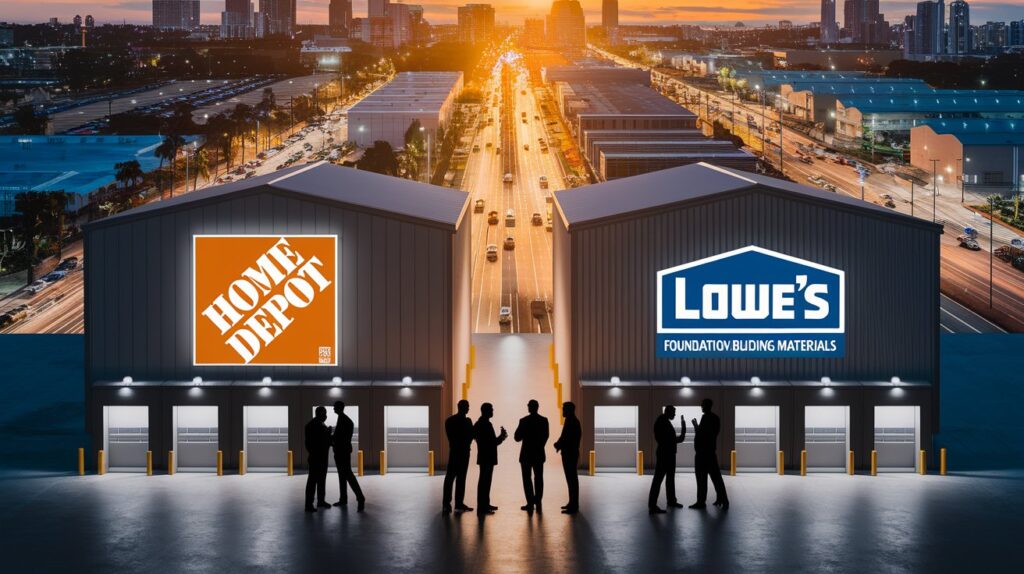- Home
- /
- Venture Capital
- /
- Home Depot’s $5.5B GMS Deal…
Introduction
If you’ve walked into a Home Depot lately and felt like it’s a bit quieter, you’re not imagining things. The home improvement giant is navigating a tricky moment. With mortgage rates stubbornly high and homeowners hesitant to take on big, debt-financed renovation projects, the DIY boom that defined the past few years is showing signs of cooling.
But while the casual weekend warrior might be pausing their plans, Home Depot is making a colossal, multi-billion-dollar bet that the professional contractor is the key to its future. That bet just culminated in the completion of its massive $5.5 billion acquisition of specialty building products distributor GMS Inc.
This isn’t just another corporate merger. It’s a fundamental shift in strategy, a response to a changing economic landscape, and a direct shot across the bow of its main rival, Lowe’s. Let’s break down what this deal really means.
The “Why”: Navigating a Shifting Market

The story behind this deal starts in the housing market. Since 2022, the average 30-year mortgage rate has stayed above 6%, a significant jump from the historic lows of the previous decade. This has a chilling effect across the entire ecosystem. Fewer people are buying new homes, and those who already own are thinking twice about tapping into their equity for a fancy new kitchen or a major addition.
Home Depot’s own executives have been candid about this. On a recent earnings call, Executive Vice President Billy Bastick noted that “customers are continuing to avoid making purchases for large home improvement projects,” particularly those that typically require financing. CFO Richard McPhail added that the “rate environment is giving them pause.”
This consumer hesitation shows up in the data. While sales figures might see modest bumps, foot traffic in Home Depot stores has actually declined. The company needed a new growth engine, and it found one in a customer segment that never really stops working: professional contractors.
The “What”: Building a Pro Empire

This is where the acquisition of GMS comes in. You might not know the name GMS, but if you’re a professional drywaller, ceiling installer, or framer, they are a vital supplier. Gypsum Management & Supply is a leading distributor of exactly those niche, essential building materials. Founded in 1971, the company operates a massive network of over 300 distribution centers and nearly 100 tool service centers across the U.S. and Canada.
But the real masterstroke was last year’s move. In 2024, Home Depot acquired SRS Distribution, a major roofing, landscaping, and pool supply distributor, for a staggering $18.25 billion. SRS itself has a network of over 800 branches.
The completed GMS deal is the next logical piece of the puzzle. GMS didn’t go to Home Depot directly; it became a direct subsidiary of SRS. Think of it like this: Home Depot is the parent company, SRS is its professional-facing arm, and now GMS is a powerful new division within that arm.
This structure is intentional. It allows these specialized distributors to keep their unique brands and expertise while leveraging the colossal backend power and capital of The Home Depot.
The Grand Strategy: Serving the “Whole Pro”

So, what’s the end game? Home Depot CEO Ted Decker has a clear mantra: “We want to serve the Pro across their entire project.”
For a professional contractor, time is money. A seamless project means not having to source drywall from one supplier, roofing materials from another, and insulation from a third. It means having reliable, next-day delivery to a job site and the ability to track orders digitally.
By combining SRS and GMS, Home Depot is building a one-stop shop that can supply virtually every need for a residential or commercial job, from the foundation to the roof. This creates powerful “cross-selling synergies,” a corporate term that simply means a roofing customer from SRS can now be easily sold on drywall and framing from GMS, and vice versa.
It’s about offering more fulfillment options, faster service, and a more integrated experience. In a competitive market, that is a compelling reason for a pro to choose Home Depot’s ecosystem over anyone else’s.
The Competitive Landscape: An Industry Arms Race

Importantly, Home Depot isn’t the only one that has noticed this opportunity. This acquisition is also a defensive move against its chief competitor, Lowe’s.
Lowe’s is pursuing an almost identical strategy. Just last month, they announced an $8.8 billion plan to acquire Foundation Building Materials, a company that, like GMS, specializes in interior products like ceilings, framing, and drywall. This isn’t a coincidence; it’s an industry-wide arms race to lock down the loyalties of professional contractors, who are far more valuable customers than the average consumer.
Recommended Reading

To better understand the business strategies and market forces behind moves like this, consider these books:
- “Good Strategy Bad Strategy: The Difference and Why It Matters” by Richard Rumelt: This book breaks down what makes a clear, effective strategy, much like Home Depot’s focused pivot to professional contractors.
- “The Everything Store: Jeff Bezos and the Age of Amazon” by Brad Stone: While about Amazon, it’s a masterclass in vertical integration and leveraging scale, which is what Home Depot is doing by building out its pro ecosystem.
- “Blue Ocean Strategy, Expanded Edition: How to Create Uncontested Market Space and Make the Competition Irrelevant” by W. Chan Kim and Renée Mauborgne: Explores how companies can create new demand instead of fighting over existing markets, relevant to Home Depot’s expansion into integrated pro services.
FAQ

Q 1: How much did Home Depot pay for GMS?
A: The total enterprise value, which includes net debt, was approximately $5.5 billion.
Q 2: Is GMS now part of Home Depot stores?
A: Not directly. GMS is now a direct subsidiary of SRS Distribution, which is itself a subsidiary of Home Depot. GMS will likely continue to operate its own network of over 300 specialty distribution centers, supplying professional contractors directly.
Q 3: Why is Home Depot focusing on professional contractors?
A: Because the market for DIY consumers has softened due to high interest rates and a slower housing market. Professional contractors represent a more stable source of revenue, as they are constantly working on projects, both big and small.
Q 4: What does this mean for the average Home Depot shopper?
A: Probably very little in the short term. You’ll still find the same products in the aisles. However, long-term, the company’s strategy and investments are increasingly focused on serving its professional segment, which may influence the types of products and services it emphasizes overall.
Q 5: Did all GMS shareholders agree to the sale?
A: The tender offer received 79.5% of the outstanding shares. The remaining shares were converted into the right to receive the same cash payment of $110 per share as part of the merger process.
The Bottom Line

The closure of the GMS acquisition is more than a headline. It is the clearest signal yet of where The Home Depot believes the future of home improvement is headed. It’s a future less reliant on the unpredictable DIY consumer and more built on the steady, project-based demand of professional contractors.
By weaving together SRS and GMS under its banner, Home Depot isn’t just expanding its inventory; it’s building a new, specialized infrastructure designed to be indispensable to the pros. In an uncertain economic climate, that might just be the smartest tool in their shed.




















Leave a Reply